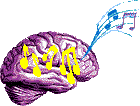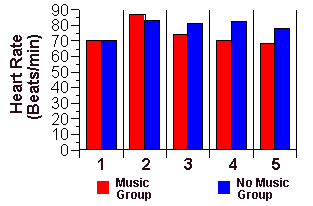|
July 23, 2001
 What do you find stressful? School? Work? Would going to the hospital
for surgery be stressful? What would you do to relax? Some people think
that listening to music reduces stress. What is it about music that
people find relaxing? Is it the melody, harmony or rhythm or something
else?
What do you find stressful? School? Work? Would going to the hospital
for surgery be stressful? What would you do to relax? Some people think
that listening to music reduces stress. What is it about music that
people find relaxing? Is it the melody, harmony or rhythm or something
else?
 New research published in Psychosomatic Medicine
investigated how music reduces stress associated with eye surgery. A
group of 40 elderly patients scheduled for cataract removal or glaucoma
surgery were questioned about the stress they felt regarding their
upcoming surgery. Half of these patients (the "music group") were given
headphones and were allowed to select music to listen to before and during
their surgery. The music group could choose from 22 different musical
types including soft hits, classical guitar, chamber music, folk music and
popular singers from the 1940s and 1950s. The other 20 patients were
placed in a "no music group" and did not get headphones or any music. To
measure stress, the researchers measured the blood pressure and heart rate
of each subject five times: one week before surgery, on the day of
surgery, just before surgery, during surgery and immediately after
surgery. New research published in Psychosomatic Medicine
investigated how music reduces stress associated with eye surgery. A
group of 40 elderly patients scheduled for cataract removal or glaucoma
surgery were questioned about the stress they felt regarding their
upcoming surgery. Half of these patients (the "music group") were given
headphones and were allowed to select music to listen to before and during
their surgery. The music group could choose from 22 different musical
types including soft hits, classical guitar, chamber music, folk music and
popular singers from the 1940s and 1950s. The other 20 patients were
placed in a "no music group" and did not get headphones or any music. To
measure stress, the researchers measured the blood pressure and heart rate
of each subject five times: one week before surgery, on the day of
surgery, just before surgery, during surgery and immediately after
surgery.
 Blood pressure and heart rate of patients in the music and no
music groups were the same when measured one week before surgery and on
the day of surgery (before anyone in the music group received the
headphones). Immediately before surgery, patients in both groups had
increased blood pressure and heart rates indicating that they were
experiencing some stress. However, when people in the music group put on
their headphones and started to listen to music, their blood pressure and
heart rate dropped back to the original baseline levels. This occurred in
patients within five minutes after they put on the headphones. Patients
in the no music group continued to experience higher than normal blood
pressure and heart rates during and after surgery. Immediately after
surgery, the music group had significantly lower blood pressure and heart
rate compared with the no music group. After surgery, the music group
patients also reported less stress and were better able to cope with their
surgery compared with no music group patients. Blood pressure and heart rate of patients in the music and no
music groups were the same when measured one week before surgery and on
the day of surgery (before anyone in the music group received the
headphones). Immediately before surgery, patients in both groups had
increased blood pressure and heart rates indicating that they were
experiencing some stress. However, when people in the music group put on
their headphones and started to listen to music, their blood pressure and
heart rate dropped back to the original baseline levels. This occurred in
patients within five minutes after they put on the headphones. Patients
in the no music group continued to experience higher than normal blood
pressure and heart rates during and after surgery. Immediately after
surgery, the music group had significantly lower blood pressure and heart
rate compared with the no music group. After surgery, the music group
patients also reported less stress and were better able to cope with their
surgery compared with no music group patients. |



![[email]](./gif/menue.gif)



